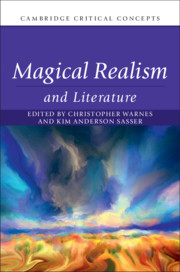Book contents
- Magical Realism and Literature
- Cambridge Critical Concepts
- Magical Realism and Literature
- Copyright page
- Contents
- Contributors
- Introduction
- Part I Origins
- Part II Development
- Chapter 6 Magical Realism and the ‘Boom’ of the Latin American Novel
- Chapter 7 Magical Realism
- Chapter 8 Beautiful Lies
- Chapter 9 Myth, Orality and the African Novel
- Chapter 10 Breaking Boundaries
- Chapter 11 East Asian Magical Realism
- Chapter 12 Magic and Realism in South Asia
- Chapter 13 Fantastic Cohabitations
- Part III Application
- Bibliography
- Index
Chapter 12 - Magic and Realism in South Asia
from Part II - Development
Published online by Cambridge University Press: 22 October 2020
- Magical Realism and Literature
- Cambridge Critical Concepts
- Magical Realism and Literature
- Copyright page
- Contents
- Contributors
- Introduction
- Part I Origins
- Part II Development
- Chapter 6 Magical Realism and the ‘Boom’ of the Latin American Novel
- Chapter 7 Magical Realism
- Chapter 8 Beautiful Lies
- Chapter 9 Myth, Orality and the African Novel
- Chapter 10 Breaking Boundaries
- Chapter 11 East Asian Magical Realism
- Chapter 12 Magic and Realism in South Asia
- Chapter 13 Fantastic Cohabitations
- Part III Application
- Bibliography
- Index
Summary
This chapter tracks the development and use of magical realism in South Asia. It argues that realism in the colonial novel grew in a complex fashion, drawing upon elements from fables, myths, puranas and epics. The term's South Asian ‘boom‘ arises in the decolonized context, specifically in the political turmoil of the 1970s, and with the publication of Salman Rushdie’s Midnight’s Children. While the essay offers a through reading of the novel, it situates Rushdie alongside a host of lesser-known English and vernacular-language writers from India, Pakistan and Bangladesh. Further, it shows that beyond this time frame the term has been used by writers with tremendous heterogeneity to address social issues ranging from gender, caste, religion, ecology, identity, refugee movements and others. Offering a list of resources, the essay builds a much-needed archive on the vast and diverse examples of magical realism in South Asia.
Keywords
- Type
- Chapter
- Information
- Magical Realism and Literature , pp. 198 - 216Publisher: Cambridge University PressPrint publication year: 2020
- 1
- Cited by

